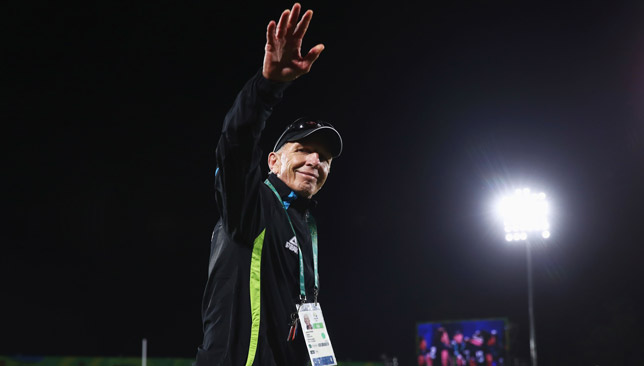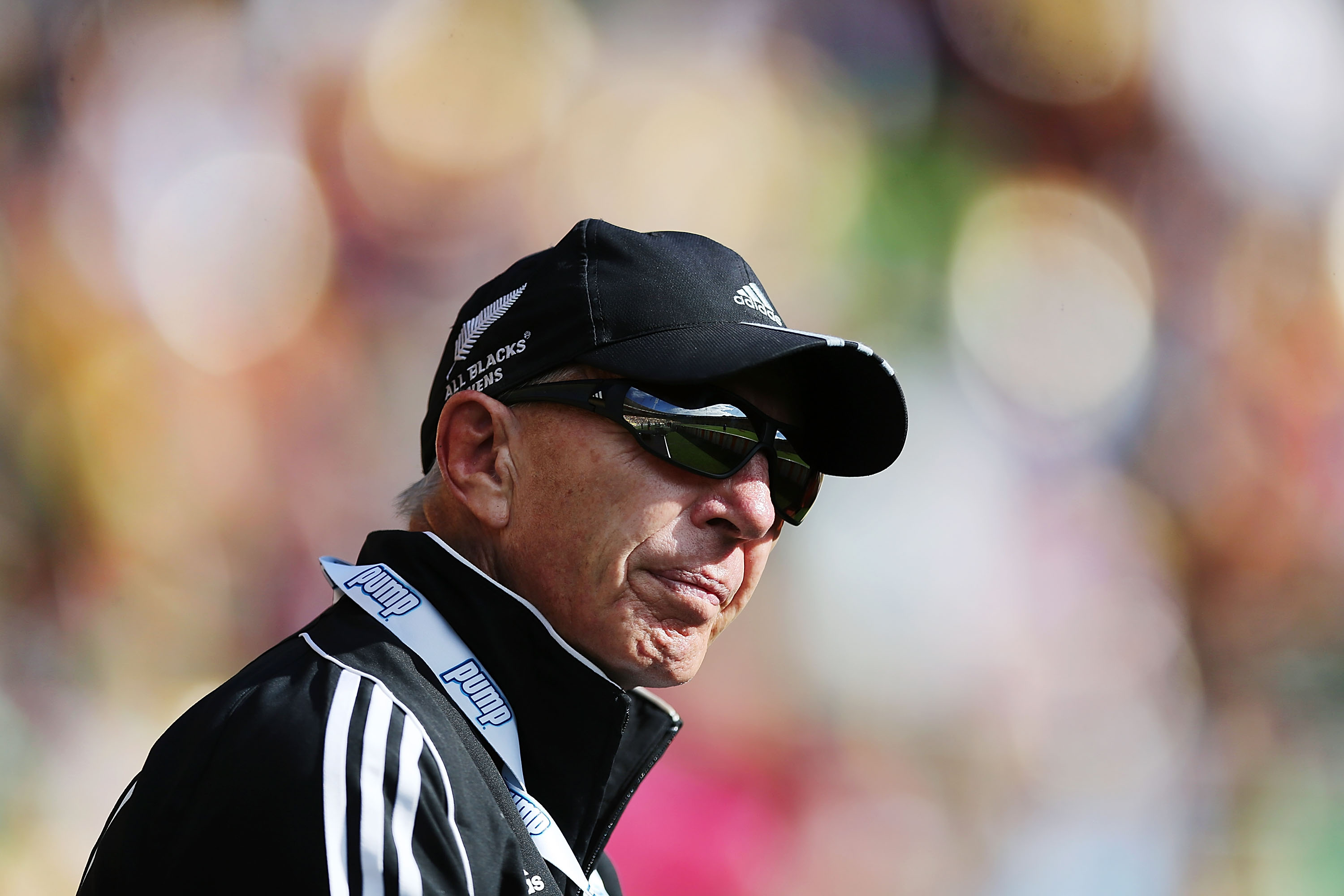
Colossal figures in the stands have garnered requisite attention during the Emirates Airline Dubai Rugby Sevens.
Fiji’s Olympic-winning coach Ben Ryan has swapped the white of the island nation for the red of sponsors HSBC, his loquacious approach and rocketing profile making him a natural fit for ambassadorial duties. For fellow luminary Sir Gordon Tietjens, a more intrinsic change is under way.
The man synonymous with New Zealand rugby watched on as his former long-term employers edged a 26-21 clash against Samoa, the side he will lead from the third round of the 2016/17 HSBC World Rugby Sevens Series On enforced “garden leave” until January 1, his vantage point at The Sevens Stadium allowed key observations to be made as future assistant Stephen Betham led the island nation to an eventual 28-14 loss to the United States in Saturday’s Trophy final.
His taciturn demeanour would not betray it, but the visionary leader reveals how re-energised he feels after being liberated from “22 years of expectations” with the All Blacks Sevens.
“It’s been pretty tough, just sitting back and watching them [Samoa],” Tietjens says of his current Dubai experience. “But I’ve been in to talk to them. I’m not even wearing any clothes of theirs. I wrote a few things down, quite a few things.
“That’s good for later on. I cannot tell you how much I am looking forward to working with them, it will be a real challenge. That is what excites me. Getting all my energy back. With New Zealand, it was 22 years of expectations lifted off my shoulders. These guys didn’t qualify for the Olympics, so I don’t have that expectation.
“Everything I am hoping for is to see that improvement, play consistent footy and get to those quarterfinals whenever we can.”
It is difficult to know where to begin when collating Tietjens’ achievements. The IRB Hall of Famer played a pivotal role in the development of 44 players who went on to don the hallowed All Blacks jersey, including Jonah Lomu, Christian Cullen, Joe Rokocoko, Mils Muliaina and Cory Jane.
A pair of Rugby World Cup Sevens crowns were also lifted and a leading 12 overall victories were claimed in the HSBC World Rugby Sevens Series. This success was made all-the-more remarkable as Tietjens’ triumphs traversed both the amateur and professional eras.
Yet within weeks of a disappointing exit at the quarter-final stage of the Rio 2016 Olympics to eventual winners Fiji, the Rotorua-native had vacated his position amid rumours about retirement.
“I stepped down,” he says. “I have never said I am retired. “I felt after 22 years, I’ve had a real crack at it. Now, it was time for someone new to come in. I’d always had in the back of mind that I wished to coach a team from the Pacific Islands. It is a fouryear deal and my aim is to get [Samoa] into the Olympic Games.
“If they make some switches in certain areas, they can be very, very good and consistent.”
Kiwi coaches are hot property in world rugby. Ireland’s Joe Schmidt, Wales and British & Irish Lions’ Warren Gatland plus Scotland’s Vern Cotter are just three high-profile examples of this trend. For Tietjens, his move is symptomatic of the globalisation of the sport.
He says: “It is a professional sport now. I have a passion for New Zealand obviously, with 22 years coaching them. Here I am now, watching Samoa play New Zealand. But that is footy.
“Look at the All Blacks coaches. Sir Graham Henry and Steve Hansen both coached Wales. Mike Friday is an Englishman and now in charge of the US. That is the way the sport is going. “I am really excited about coaching Samoa.
He'll only officially take over on Jan2017 but Sir Gordon Tietjens seen supporting @SamoaRugby Sevens at #Oceania7s
— 7s in South Africa (@BlitzBokke) November 12, 2016
Pic: Go The Manu on FB pic.twitter.com/UFverTgK3F
“End of the day, I just wanted to see the Samoan boys get their confidence up. It was good for me as I was at a high level. There are promising things to come, hopefully.”
Samoa remains a hot bed of rugby talent, yet so many eschew their own country for the riches on offer in New Zealand. Tietjens tapped into this resource when with the All Blacks, with five of his 13-man squad at Rio last summer either being born there or having strong familial links.
The effect of this drain was exemplified this weekend when veteran skipper DJ Forbes made it to a record-breaking 80 tournaments for them in Dubai, despite the potential to represent Samoa in the formative years of his celebrated career. Tietjens hoped his heralded arrival could help stem this flow.
“There are a lot of youngsters on the island. But the really talented ones go to New Zealand and get contracted, so they never get a chance to play for Samoa,” he says.
“You’ve got to realise that financially if they are contracted by New Zealand they will earn so much more than being contracted by Samoa. Of course, once you play for one of those countries, you are captured.
“For a lot of Samoans the financial implications for playing or not are quite huge. For them, they’d love to play for Samoa but sometimes it is better to go the other way.

“I have had a few Samoans living in New Zealand who are really keen to come across and have a crack for the side. We are sort of formulating a squad now.
“Stephen has selected a squad of 13 for this tournament and there are probably another 10 back on the island. There are also another halfdozen in New Zealand who could make up the squad for the rest of the World Series, and some youngsters.
“As an example, we took seven new kids for the Oceania Sevens as that captures them. They only lost to a very strong Fiji side, so they can play. It is now consistency which I need to get out of them.”
Fiji have laid the blueprint for what Pacific Islanders can achieve. Ryan ended his inspirational three-year tenure in the glorious aftermath of the Rio Games. Although not a perfect fit, Tietjens is optimistic the careful guidance he specialises in can lead Samoa to the kind of wins not experienced since their dominance of the 2009/10 World Rugby Sevens Series.
“The difference between Fiji and Samoa is there are nearly one million people in Fiji,” he added. “The numbers they have playing the game are huge.
“There are probably only 200,000 people in Samoa. There certainly are not the numbers, but there are talented athletes.
“They have the athleticism of the Fijians, but they’ve also got the physicality. I suppose the shift is between having a real work ethic, being very, very fit and the nutritional side.
“If those happen, we’ll see some real athletes playing the game.”